
The Jerusalem Artichoke heralds the end of Summer as it bursts into sunflower blooms. This beautiful cousin in the sunflower family hides its edible parts underground.
A native plant to North America, Native Americans used this gorgeous plant long before the Europeans even set foot on this land. European settlers quickly fell in love with this plant and took it back to Europe, where it soon became a delicacy in many countries.
Despite being a native species, it can be considered invasive, as it can establish itself in various habitats and grow quite prolifically.
Fast Facts
- First recorded name, kaishucpenauk, was given to the plant by the Virginia Algonquian. It translates roughly to "Sunroot"
- The name "Jerusalem Artichoke" is believed to come from the Italian word for sunflower, "girasole". Pronounced, jee·ruh·sow·lay, it is thought that this was mispronounced over time and eventually morphed into the word "Jerusalem". Samuel de Champlain, a French explorer, sent samples of the tuber back to France, describing its taste as similar to that of an artichoke.
- It is also known as the French Potato, the Canadian Potato, Lambchoke, and Sunchoke.
- Historians agree that the Jerusalem Artichoke was served at the first Thanksgiving. The Wampanoag Indian tribe, who were present for the meal, harvested and ate the tuber. Therefore, it is more than likely that they served it to the Pilgrims.
- More comically, the name "Fartichoke" refers to the fact that it can cause excessive gas if eaten in large quantities.
- Although known chiefly for its edible qualities, it is a beneficial plant to those with diabetes.
- The plant can reach heights of 6 to 10 feet.
Identification

Where to Find it
The Jerusalem Artichoke prefers well-drained, fertile soil, but can also tolerate poor soil and heavy clay. It is easier to identify in the Fall when it blooms into small delicate sunflowers.
Once it establishes, it will grow unchecked and choke out other native plants. If you plan to cultivate this plant, it is essential to keep it in check.
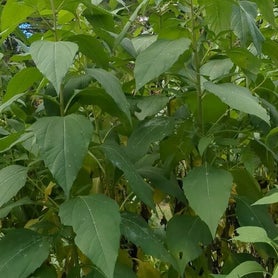
Leaves
The leaves of the Jerusalem Artichoke are often described as lance-shaped. They are rounder at the base and then gradually develop into a point at the end. The top surface may feel rough or hairy, while the underside of the leaf is soft. The edges of the leaves are serrated, and the veins of the leaf come off the center vein in a "U" shape, facing up to the tip of the leaf.

Flowers
One plant will produce an array of small, approximately 4 to 5 inches in diameter, sunflower-like flowers. They begin to bloom in August and remain in bloom through October. Much like their sunflower cousins, they will tend to face the direction of the sun.
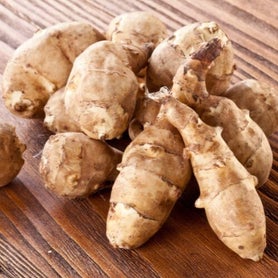
Tubers
The tubers contain a complex sugar known as inulin. Inulin is a non-digestible prebiotic that helps to promote gut health. When the tuber is cut from the plant, inulin begins to convert into fructose. The longer the tuber sits, the sweeter its flavor becomes. Inulin is also beneficial for people with diabetes as it helps to lower blood sugar levels.

DANGEROUS LOOK-ALIKES
Because there are no known dangerous look-alikes, Jerusalem Artichoke is a great beginner plant.
Harvesting

The best time to harvest the tubers is when they are fully ripe. Wait until after the first frost, and when the plant has died back. Then dig up the tubers and use them. Since they do not store well when fresh, only dig up the amount you plan to use.
Storing
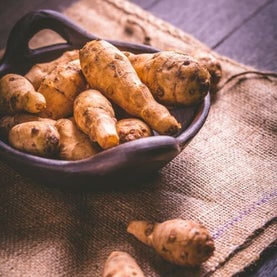
You can store the tubers in a refrigerator for a few days, but they are best used fresh. Some sites recommend wrapping the tuber in paper towels to help with moisture content. Other sites discourage wrapping the tubers and storing them in plastic bags. To be safe, dig the tubers as needed and use them within a day.
Medicinal Properties and Studies
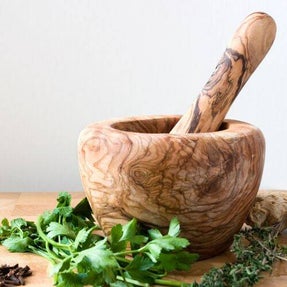
Medicinal Properties
- Gut Health: The number one health benefit of Jerusalem Artichokes is its gut health superpower
- Prebiotic: High in inulin, a prebiotic fiber that helps good gut bacteria grow and inhibits the growth of bad gut bacteria
- Constipation Relief: Contains a high amount of soluble fiber that can help to move undigested food into the large intestine
- Gas and Bloating Relief: Sometimes known as "fart-a-chokes", the high fiber content can help to alleviate gas and bloating
- Blood Sugar Regulation: Since inulin is not digested in the upper digestive tract, it passes through the digestive system mostly intact. As a result, it delays the absorption of glucose and does not cause spikes in blood sugar levels after it is eaten
- Antioxidants and Anti-inflammatory: Contains some antioxidants and anti-inflammatory properties
- Cardiovascular Health: A recent study linked the inulin in the tuber to be beneficial in cardiovascular health (see "Current and Ongoing Studies" for more information)
- Anti-Cancer Properties: A recent study showed it to be effective in fighting colon cancer (see "Current and Ongoing Studies" for more information)
- Potential Radioprotector: Shown to protect cells of animals that were treated with radiation (see "Current and Ongoing Studies" for more information)
- Weight Loss: Because of the high fiber and inulin content, the tuber can aid in weight loss

Current and Ongoing Studies
Several current and ongoing studies have proven the effectiveness of the Jerusalem Artichoke tuber. Here are a few that are interesting:
- Promotes a healthy gut, antidiabetic, anti-carcinogenic, anti-fungistatic, anti-constipation, body mass-reducing, metabolism-improving agents: https://pubmed.ncbi.nlm.nih.gov/32583794/
- Alleviate hyperglycemia in high-fat diet: https://pmc.ncbi.nlm.nih.gov/articles/PMC10458736/
- Protect cancer patients from harmful radiation treatments: https://pubmed.ncbi.nlm.nih.gov/39053103/
- Used to treat inflammatory symptoms of RSV: https://pubmed.ncbi.nlm.nih.gov/36193325/
- Inhibit Colon Cancer cell growth: https://akjournals.com/view/journals/066/52/1/article-p12.xml
How to Use
Please Read:
The tubers of the Jerusalem Artichoke have been labeled as a GRAS (Generally Recognized as Safe) by the Food and Drug Administration (FDA). There are several current and ongoing studies regarding its effectiveness. If you have any pre-existing health concerns (especially respiratory or kidney) or are using any types of prescription medications or sedatives, it is always best to consult your doctor before use. Jerusalem Artichoke is high in fiber. Large doses can cause diarrhea, vomiting, bloating, or gas. Although very rare, high doses can cause anaphylaxis. Women who are pregnant or breastfeeding should not use Jerusalem Artichoke. Jerusalem Artichoke is safe for children and should be used in small amounts. Always use the recommended and proper dosing for each use. If you think you are having any reaction at all to the Jerusalem Artichokes, discontinue use immediately and contact your doctor or healthcare provider.
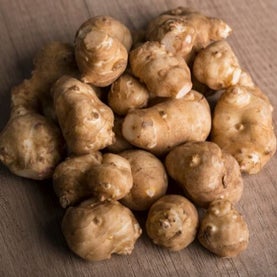
Presoak before Use
Jerusalem Artichokes can cause gas, bloating, and diarrhea. To prevent this, soak the tubers before use.
- Rinse and gently scrub the loose dirt from the tuber
- Mix 4 cups of water with two tablespoons of lemon juice. Cover the tubers with this mixture. If need be, mix more water and lemon juice and add to the bowl until the tubers are completely submerged
- Soak for 45 minutes to 1 hour
- Rinse and gently scrub again, then proceed with your recipe
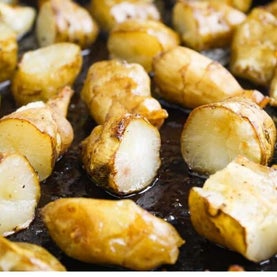
Simple Roasted Jerusalem Artichokes
1 Pound Tubers, washed and presoaked
1+ Tablespoon Olive Oil
Salt and Pepper to Taste
- Preheat your oven to 350°F
- Cut presoaked tubers into similar, bite-sized pieces
- To a baking dish, add one tablespoon of oil
- Place cut tubers in the bottom of the dish
- Drizzle with additional olive oil and toss to coat
- Sprinkle with salt and pepper
- Bake for 30-40 minutes or until they are soft with poked with a fork

Fried Jerusalem Artichokes
1 Pound Jerusalem Artichokes
2 Tablespoons Olive Oil
2 Tablespoons Butter
2 Large Garlic Cloves, finely chopped
1⁄4 teaspoon Salt
1⁄4 teaspoon Black Pepper
- Scrub artichokes and presoak them
- Slice each artichoke to 1/4 inch thick slices
- In a frying pan, heat olive oil and butter on medium-high heat
- Add sliced artichokes, garlic, salt, and pepper; stir well to coat artichokes
- Fry for about 4 minutes, stirring often
- Artichokes should be slightly crunchy when done

Jerusalem Artichoke Soup
For Soup
1 Small Onion
1 Clove Garlic, minced
18 oz Jerusalem Artichokes, cleaned
3 Tablespoons butter
4 Cups Chicken Stock
Salt and Pepper, to taste
For Crumb Topping
2 Slices Stale Bread
1 Clove Garlic, minced
2 Tablespoons Parsley, chopped
1 Tablespoon olive oil
1 Small Lemon, zested
- To Prepare Soup
- Fill a large bowl with cold water
- Peel the Jerusalem artichokes and cut them into medium-sized chunks
- Place the pieces in the bowl of water as you cut them
- In a large pot, melt the butter
- Add the onion and cook until softened and translucent
- Add the garlic and Jerusalem artichokes and stir, ensuring they are well coated in the butter
- Cover and leave to sweat for 3 - 4 minutes.
- Add the stock, cover, and bring to a simmer
- Once simmering, reduce the heat and continue to simmer for around 20 minutes until the Jerusalem artichokes are tender
- To Prepare Crumb Topping
- Remove the bread crusts and cut the bread into medium breadcrumbs
- Heat the olive oil in a skillet over medium heat and add the garlic
- Cook until soft and fragrant
- Add the breadcrumbs and toast for a few minutes until the crumbs are dry and lightly browned all over, stirring and turning regularly
- Remove the crumbs from the heat and mix through the parsley and lemon zest
- To finish and serve
- Once the Jerusalem artichokes are soft, remove the soup from the heat and blend until smooth
- Adjust the seasoning with salt and pepper, as needed
- Serve the soup, topped with the crumb topping
Add comment
Comments